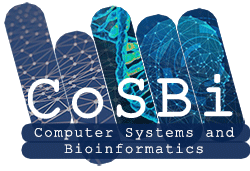The Research Unit of Computer Systems and Bioinformatics (CoSBi Lab) of the Campus Bio-Medico University of Rome began its research activities in 2004 which immediately concerned the use of Artificial Intelligence techniques with particular attention to applications in the biomedical field.
Currently, the research activity concerns various methodological aspects of computer science. The main areas of interest are multimodal (deep) learning, generative approaches, eXplainable AI, resilience of AI algorithms, federated learning, (deep) reinforcement learning, and computer vision. These topics find application in industrial, civil, and biomedical sectors. Among them, the areas of greatest impact are connected health, the development of 5P medical tools in oncology, with particular attention to lung, breast, and prostate cancer, but also in the sector of viral infections, the application of generative models for virtual scanning and insurance applications, NLP techniques for the analysis of medical records, the analysis of time series of biomedical and industrial signals, the application of federated learning in medicine, the prediction of energy production in energy communities, precision agriculture, social media analytics, the development of intrinsically explainable and transparent models to facilitate adoption in everyday life, digital twin tools for path planning in robotic surgery, and analysis of large 3D images
The unit also stands out in the development of data processing systems optimized for low latency processing on embedded and FPGA devices, used as a single node or connected in a network in the creation, using data fusion techniques, of integrated and intelligent systems in the fields health, industrial and environmental monitoring applications. Networks, IoT, and distributed systems, including DLT, represent an application field covered by the unit with industrial and research developments, linked to activities with external partners and participation in start-ups. Furthermore, the Research Unit also includes expertise in control and estimation theory for stochastic, distributed, multi-agent, and delay systems. Applications concern sensor networks, optimal resource management in energy communities, and modeling in the biomedical field (artificial pancreas and study of the dynamics of drug absorption).



